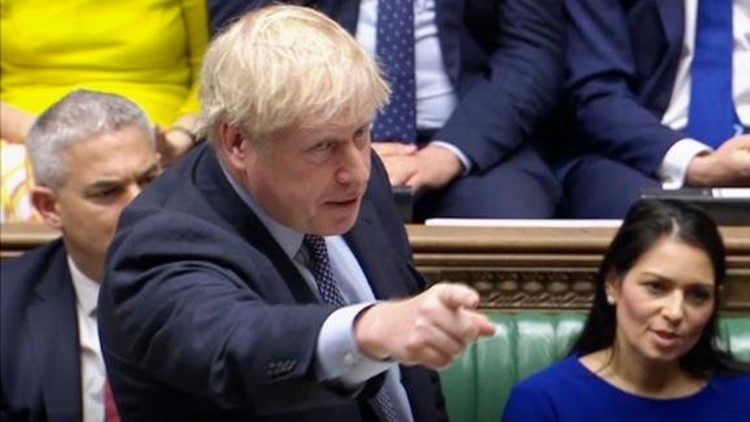LONDON — Welcome to what might be one of the most important days in British political history.
Earlier this week, Boris Johnson did the near impossible and secured a new Brexit deal from the European Union.
Astonishingly, after months of saying that Theresa May’s deal could not be changed, the EU shocked everyone by throwing out the controversial Irish border backstop and replacing it with an alternative plan, cooked up by team Johnson.
Even more astonishingly, EU leaders seem happy with this deal and have been effusive about Johnson — the man with whom they dreaded negotiating.
Brexit wrecking ball?
However impressive Johnson’s Brussels victory might be, securing it could turn out to be the easiest bit of the Brexit process.
The UK Parliament is sitting on a Saturday for the first time in decades, where lawmakers will give Johnson the thumbs up or thumbs down. The immediate fallout of that vote could have profound consequences for the future of the United Kingdom.
Some lawmakers have already tabled amendments that could ruin Johnson’s day. Unsurprisingly, opposition MPs will put forward proposals to scrap Brexit or to hold a second referendum. But the amendment getting the most attention right now is one tabled by a former Conservative minister, Oliver Letwin.
Letwin says he personally will vote for Johnson’s “excellent deal,” but wants to ensure that the UK doesn’t fall out of the EU without a deal by accident. In short, if this amendment passes, it means that Johnson’s deal cannot be fully approved in Parliament for another week or so. The reason, Letwin says, is to give Parliament enough time between October 19 and 31 to pass all of the legislation required to deliver Brexit.
That is not how Johnson and his allies see it. They think it’s another wrecking ball designed to frustrate their plan to deliver Brexit from an MP who doesn’t want to leave the EU. They think this is because if lawmakers haven’t passed the Brexit deal by 11 p.m. on Saturday, Johnson will be legally required to request a Brexit delay. More on that later.
Johnson’s charm offensive
Back to the main vote on Johnson’s deal. Right now, it’s far too close to call. Johnson doesn’t have a majority in Parliament and his supposed Northern Irish allies, the DUP, have already said that they will not back the government. His opponents have lined up to criticize the deal. And there’s serious concern that the arch-Brexiteers in his own Conservative party could vote against the deal.
His closest allies are confident that Johnson can win over enough people to get the numbers.
And they have good reasons to be confident. In recent weeks, Johnson’s tone towards Europe had been far more measured and diplomatic. It did the trick with the EU, so why not British lawmakers? His charm offensive has been less the bombastic flurry of energy we are used to with Johnson, and more the calm and cooperative man we’ve seen lately.
“I don’t think there is a great deal of arm twisting per se. Much more about cajoling, giving briefings and accurate information, as opposed to rumor and misinformation, which is rife,” one government minister and Johnson ally told CNN.
And he’s been reminding opposition lawmakers that if they don’t vote for his deal then they can’t be certain that Brexit will be delayed, despite the fact that Johnson is legally obliged to request a Brexit extension if no deal has been agreed by 11 p.m. on Saturday night.
Last month, opposition lawmakers passed legislation that bound Johnson to this commitment. He has said that he will comply with the law, but is keen to remind his opponents that this decision relies on the EU27 unanimously agreeing to it.
Johnson: My deal or no deal
So, that’s the Johnson calculation today: it’s my deal or the real risk of no deal.
While he’s technically correct that the EU could refuse an extension to avoid a no-deal exit, it’s perhaps wishful thinking. The EU has always said that delays are only granted if there is something concrete that could break the UK’s domestic deadlock. Under the circumstances that Johnson requests an extension, it’s almost certain that an election would follow.
That’s why the so-called Super Saturday sitting is so important. If the deal passes, the UK finally leaves the EU. Johnson would probably hope to capitalize on his success and call for a general election soon after. His poll ratings are good at the moment, and you’d think they would improve after delivering Brexit.
If the deal goes down, Johnson requests the extension and it’s approved, then we get into the nasty election. Both sides would be looking to tear lumps out of each other. Johnson will point at his opponents saying that they stole Brexit.
Remainers will say that Johnson played chicken with the UK’s economy and nearly took us to the edge with no deal. And hardline Brexiteers will say that Johnson is a sell-out.
No one knows what the outcome of this election would be. Johnson is ahead in the polls at the moment, but that could change quickly as his credibility takes a hit and the opposition parties present alternative options to Brexit, such as a second referendum, no deal exit, or scrapping Brexit altogether.
And if the EU refuses an extension, then all hell breaks loose.
So for all that, Saturday might look like just another vote on another Brexit deal, but its long-term implications for the future of the world’s fifth largest economy could not be more serious.



